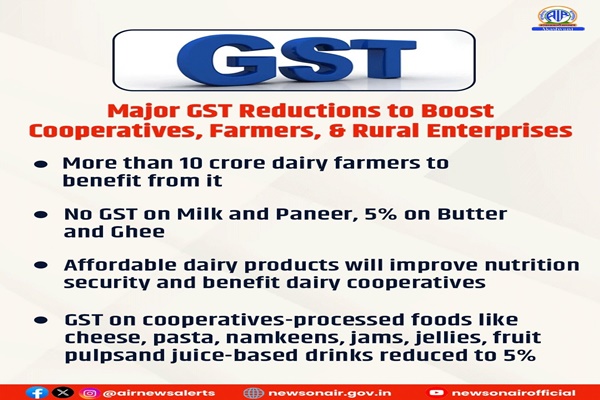Centre has recently announced wide-ranging reductions in Goods and Services Tax across key sectors that directly impact cooperatives, farmers, rural enterprises and benefit more than 10 crore dairy farmers in the country. Ministry of Cooperation said in a statement that these landmark reforms will strengthen the cooperative sector, make their products competitive, increase demand of their products and increase income of cooperatives. The reforms will promote rural entrepreneurship, and ensure affordable access to essential goods for millions of households. GST rate reductions will benefit cooperatives in farming and animal husbandry, promote sustainable farming practices, and benefit small farmers. The Ministry added that these Next Generation GST reforms brought under the leadership of Prime Minister Narendra Modi have been hailed by the entire dairy cooperative sector, including the big cooperative brands.
In the dairy sector, direct relief has been provided to farmers and consumers as milk and paneer, whether branded or unbranded, have been exempted from GST. The tax on butter, ghee and similar products has been reduced from 12 percent to 5 percent. GST on milk cans made of iron, steel or aluminium has also been lowered from 12 percent to 5 percent.
These measures will make dairy products more competitive, provide direct relief to dairy farmers, and strengthen women-led rural enterprises, particularly self-help groups engaged in milk processing. Affordable dairy products will enhance nutrition security by making essential protein and fat sources more affordable for households, and raise incomes for cooperatives in the dairy sector.
The GST on tractors below 1800 cc has been reduced to 5 percent, which will make tractors more affordable and benefit not only crop farmers but also those engaged in animal husbandry and mixed farming. GST on key fertiliser inputs such as ammonia, sulphuric acid and nitric acid has been reduced from 18 percent to 5 percent. This has lowered input costs for fertiliser companies, preventing price hikes for farmers, and ensuring timely availability of affordable fertilisers during sowing seasons.







